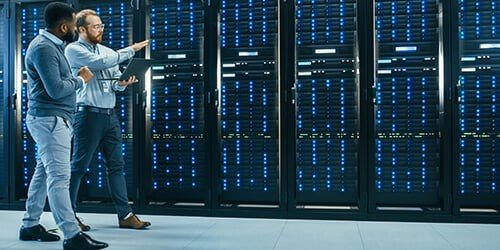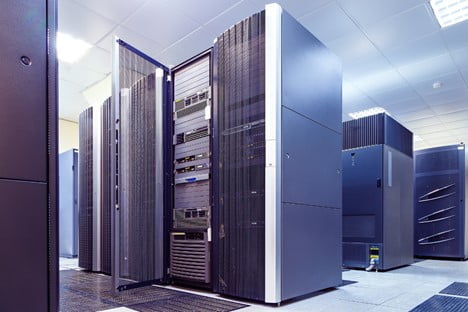Things To Consider In Server & Storage For The Data Center
A Data Center will consist of multiple hardware and software such as Servers, Storage, Network switches, WAN routers, Firewall, Backup software, Tape Library, Monitoring software, OS, Hypervisor, DB, etc. In this blog, we are going to share our insights and things to consider in Server & Storage if you are looking for a brand-new server/storage.

Servers– Servers are the base hardware to host the Operation system/ Hypervisor. Depending on the requirement we can choose the server form factor. If more compute and less local storage are required, then a blade server is the right option. If more compute & local storage is required, then a rack server is the right option.
Here are the market leaders for the blade & rack servers – HPE, DELLEMC, Cisco & Lenovo
Things To Consider For Servers
- According to the application requires the processor cores, clock speed and the category (Bronze/Silver/Gold/Platinum) should be factored
- According to the application requires the RAM type and size should be selected. Best to choose 16 GB/32 GB/64 GB RAM. At least 30 % of DIMM slots should to unpopulated for future scalability.
- According to the IOPS requirement for the application, the local disk drives (SSD/HDD) can be factored in. If HDD, then best to choose 10K SAS Drives. If SDD then SATA/SAS SSD’s of required capacity can be factored in. At least two disk drives are required for the high availability of the base OS/ Hypervisor. If rack servers at least 30% of the HDD Slots should be unpopulated for future scalability.
- Best to factor 2* 10Gbps FCoE or higher network bandwidth per blade server. For rack servers 2* 10Gbps ethernet and 2*16Gbps FC
- In the case of blade servers best to factor N+N Redundancy for power. For rack servers dual power supply.
Storage– Storage is the very critical hardware on which the data is stored. The following are the different types of storage

Local Storage or Direct Attached Storage – This type of storage is locally attached to the server. According to the local storage requirement, the number of drive slots (4LLF/8SSF/12LLF/24SFF) can be considered. For the data availability in case of any disk failure, we can configure the RAID to protect the data. Majorly used RAID levels in blade servers are RAID 1/10
Network Attached Storage – This type of storage is connected over the network. The NAS functionality can be achieved by the combination of any server form factor & the Operating system. Mostly the NAS is used to create the network shares to store/ access the shared files/data across the users. Also, NAS is used to store the log files, backup data, etc., For enterprise-level NAS most of the OEM’s provide the Rack server with the Windows Storage Operating System preinstalled on it. For the data availability in case of any disk failure, we can configure the RAID to protect the data. Majorly used RAID levels in NAS servers are RAID 10/5/6
Here are the market leaders for the NAS Servers – HPE, DELLEMC, Synology, QNAP
SAN Storage – This type of storage is connected to the servers through the SAN Switch using FC Cable. The FC protocol will be used for the communication between the server, SAN Switch, and SAN Storage. Mostly the SAN Storage is used for high performance, availability, reliability, and scalability. According to the IOPS we can choose the disk combination HDD/SSD. All-flash storage pool (SSD Drives) is used for very high performance and sub-millisecond latency. A hybrid storage pool (HDD & SDD combination) is used for the high performance for mixed workloads ( Apps, DB, Files). HDD storage pool is used to just store the data which does not require high performance.
Here are the market leaders for the SAN Storage – Pure Storage, NetApp, DELLEMC, HPE, Hitachi
Things To Consider For The SAN Storage
- Dual Active/Active controller
- Best to choose 128GB cache or higher
- Redundant power supplies for the DPE & DAE
- 20% of SSD capacity & 80 % of HDD capacity
- Data at the rest encryption feature
- Auto Data tiering feature
- Synchronous and Asynchronous replication support
- RAID level support 10,5,6
- 1 Drive spare for every 30 Drives
- At least 4*16G FC ports per controller
- At least 2*10SFP+ iSCSI/Ethernet ports per controller
Is your Server/ Storage being due for a refresh? Are you looking for the best suite server/ storage? Our engineers at Zindagi Technologies can help you in choosing the best one in terms of features, support, scalability, reliability & cost. Our service offerings are Consulting, Design, Implementation & Support. Get in touch with us or drop us an email and we will connect with you. You can also give us a call at +919773973971.
Author
Leela Krishnan
Data Center Consulting Engineer
